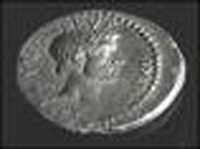Rare silver coin back to Greece
The tiny coin, a denarius issued in 42 B.C. by Brutus, the chief assassin of Julius Caesar, is one of only 58 in the world. Greek authorities say it was illegally excavated in Greece, and sold last year by two Greek suspected smugglers to London's Classical Numismatic Group Inc.

Culture Minister Giorgos Voulgarakis hailed the 2,000-year-old artifact's return on Tuesday as an important success in Greece's struggle to reclaim smuggled antiquities.
The Roman coin - which weighs only 0.1 ounces - was returned after Greek officials initiated legal action against the British dealership, based on a European Union directive on the return of cultural goods illegally removed from the territory of a member state.
Voulgarakis said the Classical Numismatic Group unconditionally handed over the denarius this month to a lawyer representing the Greek state, after Greece was able to prove it had been illegally excavated.
The coin was issued by a mobile military mint used by Brutus to pay his soldiers during the wars that followed Caesar's assassination in 44 B.C. by a group of his friends and proteges - immortalized in Shakespeare's play, "Julius Caesar."
Decorated with the head of Brutus on one side and a pair of daggers flanking a cap on the other, the denarius carries the inscription Eid Mar - short for the Ides of March, or March 15, the date of Caesar's murder, the AP reports.
Subscribe to Pravda.Ru Telegram channel, Facebook, RSS!





